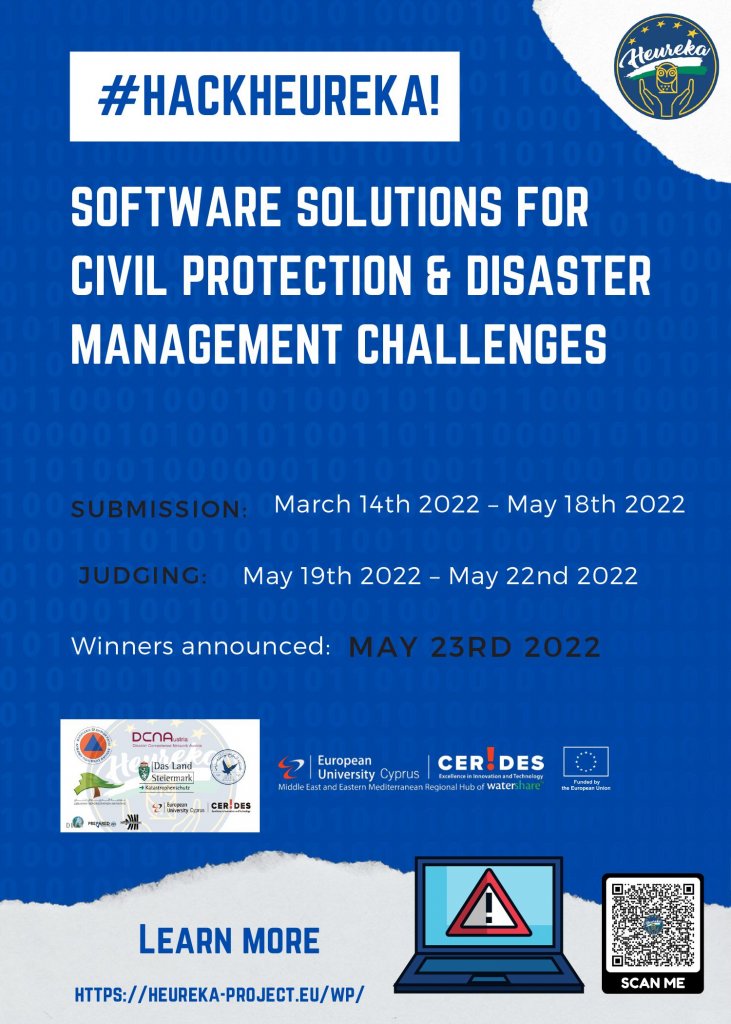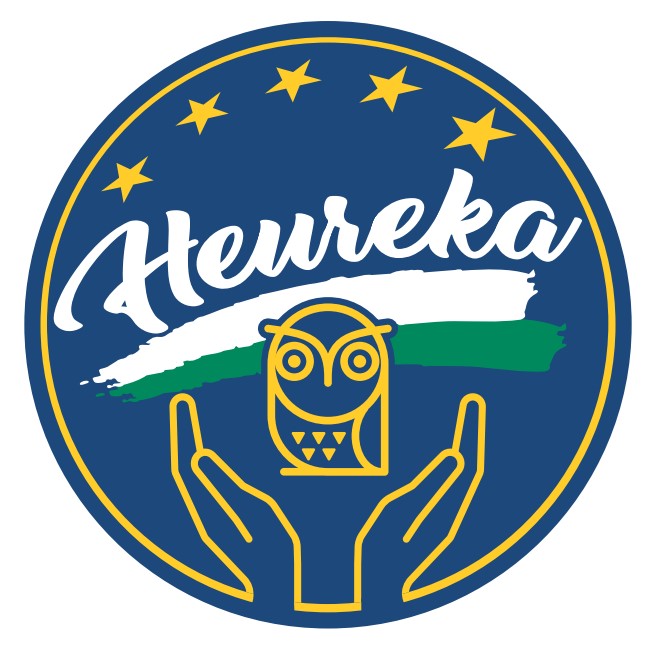
European University Cyprus and CERIDES are excited to announce the implementation of the 2nd online #HackHEUREKA hackathon, within the framework of the DG-ECHO – funded project HEUREKA.
CHALLENGE:
Apply your ideas, creative skills, and programming expertise in order to create a software solution which addresses civil protection challenges faced by communities potentially affected by natural disasters. We are particularly interested in software solutions which take in account local environment and needs relevant to the beneficiary countries of HEUREKA. More information about this challenge is provided in technical Annexes I & II below.
WHO CAN PARTICIPATE:
#HackHEUREKA is open to participants from all age groups and nationalities. However, we will be particularly happy to receive registrations from high-school and University students.
REGISTRATION PROCESS:
To participate in the #HackHEUREKA hackathon, follow these steps:
1. Register your team (up to four participants) on the #HackHEUREKA registration website:
https://forms.gle/qffjnLXPnyqB2YoBA
2. Develop a prototype software application in order to showcase your idea to relevant stakeholders. This will also be accompanied by a short (< 4 minutes) YouTube video presentation of your idea.
3. Submit your application, along with a link to the YouTube presentation. Your submission link will be provided after your registration.
Mentoring support on disaster preparedness topics, as well as slack communication tools will be provided during the hackathon submission period. More information will be provided after your registration.
All submitted models are open source, and they will be made available for the development of prototype open applications which serve the communities in the countries of the HEUREKA project, not for industrial purposes.
JUDGING CRITERIA:
Relevance to the Domain of Civil Protection
Originality
Potential Impact on Disaster Management Challenges
Technical Presentation of the Software
PRIZES:
Six (6) scholarships are available for the winners of the #HackHEUREKA Hackathon: The scholarships are kindly offered by European University Cyprus, and are as follows:
a) Three (3) scholarships of 50% each which can be used in any of the following Undergraduate (BSc) Programs of Study (all conventional):
BSc in Computer Science, BSc in Computer Engineering, BSc in Electrical & Electronic Engineering and BSc in Computer Information Systems
b) Three (3) scholarships of 50% each which can be used in any of the following Postgraduate (MSc) Programs of Study:
MSc in Cybersecurity (Distance Learning), MSc in Artificial Intelligence (Distance Learning) and MSc in Computer Science (conventional)
Submissions: March 14th 2022 – May 18th 2022
Judging: May 19th 2022 – May 22nd 2022
Winners announced: May 23rd 2022

ANNEX I: GENERAL INFORMATION & RESOURCES ABOUT DISASTER MANAGEMENT
The COVID-19 pandemic has dramatically highlighted the fact that natural disasters can still severely disrupt the operation of technologically enhanced societies, resulting in millions of casualties and instigating short- and long-term adverse effects in the livelihoods of billions of citizens around the world. Modern societies approach disasters within the context of a comprehensive disaster risk reduction and management (DRRM) framework. The Hyogo Framework for Action 2005–2015 and the Sendai Framework for Disaster Risk Reduction 2015–2030 have formalized this framework and have allowed its operationalization on national, regional, and global levels.
Preparedness constitutes a key stage of the DRRM framework. European Union defines disaster preparedness as “a set of measures undertaken by governments, organisations, communities or individuals to better respond and cope with the immediate aftermath of a disaster, whether it be human-made or caused by natural hazards. The objective is to reduce loss of life and livelihoods. Simple initiatives can go a long way, for instance in training for search and rescue, establishing early warning systems, developing contingency plans, or stockpiling equipment and supplies. Disaster preparedness plays an important role in building the resilience of communities“.
The #HackHEUREKA hackathon aims to contribute to the resilience of communities in the area of Middle East (and beyond), by facilitating the interaction and exchange of ideas between scientists, IT professionals, students, civil protection stakeholders, citizens, and experts, for the development of prototype preparedness solutions.
Detailed information about the concept of preparedness can be found at the following sites:
https://ec.europa.eu/echo/what/humanitarian-aid/disaster_preparedness_en
Typical examples of disaster management applications can be found at the following sites:
https://www.wired.com/story/best-emergency-apps/
https://www.sciencedirect.com/science/article/pii/S2212096321000255
We are looking forward to your ideas!
ANNEX II: ABOUT THE HEUREKA PROJECT
The Civil Protection Knowledge Network Partnership Platform – Middle East (HEUREKA) bridges across knowledge holders relevant to disaster management and humanitarian aid actors, enhancing coordination, cooperation, compatibility and complementarity between capacities and improving the competence of experts; it creates a bridge between the different actors in this area at a crucial moment – between the European Union and its Southern Neighbourhood, specifically the Middle East, and develops synergies between humanitarian and civil protection actors. At the same time, the network supports the introduction of an organizational approach in fostering and transferring of knowledge in civil protection, so that organizations and communities can make use of the enhanced knowledge provided.
Full Information about the HEUREKA project is available at the following location:
